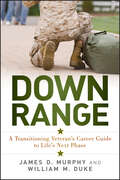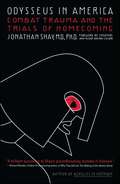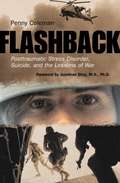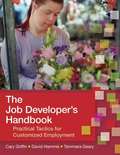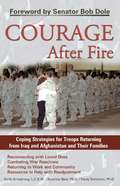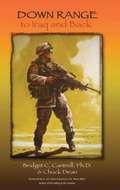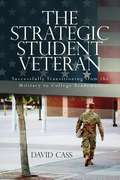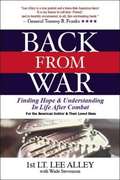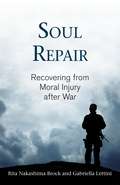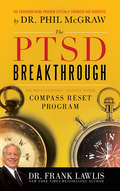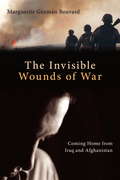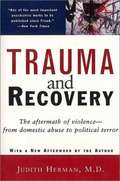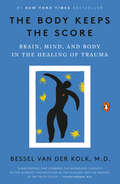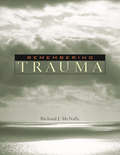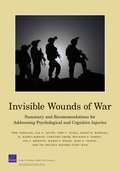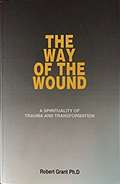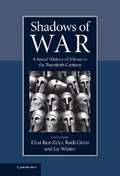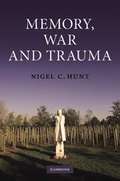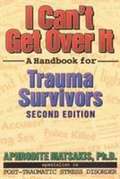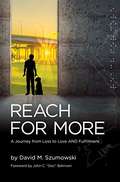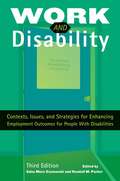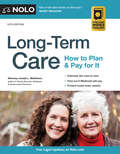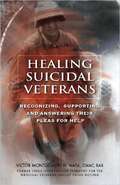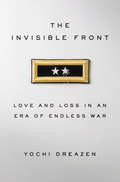Special Collections
Resources for Returning Veterans
Description: Separating from military service and returning to civilian life can present unique challenges for veterans. This collection contains resources to help veterans and their families making this transition. #general
- Table View
- List View
Down Range
by James D. Murphy and William M. DukeWritten by veterans who have successfully made the transition, Down Range offers career planning guidance to U.S. military veterans coming off active duty. This is NOT simply a guide to transitioning from the military to the civilian world. This is NOT a guide to getting a job. This book IS a guide to developing a post-military career, not just for the first few days, weeks, or months after active duty, but for the rest of your employed life.
This simple and effective planning process has been taught to more than 1 million business executives in companies all over the world.
This book challenges veterans to change their mind-set and understand just how different the "wilderness" of civilian employment is from military experience. Down Range provides an appreciation for what's important to a business, helping you to become a valuable asset throughout your career.
Odysseus in America
by Jonathan ShayIn his acclaimed book Achilles in Vietnam, Dr. Jonathan Shay used the Iliad as a prism through which to examine how ancient and modern wars have battered the psychology of the men who fight. Now he turns his attention to the Odyssey, Homer's classic story of a soldier's homecoming, to illuminate the real problems faced by combat veterans reentering civilian society.
Drawing on his years of experience working with Vietnam veterans, Shay illustrates how the Odyssey can be read as a metaphor for the pitfalls that trap many veterans on the road back to civilian life. He also explains how veterans recover, and advocates changes to American military practice that will protect future servicemen and servicewomen while increasing their fighting power.
The Odyssey, Shay argues, offers explicit portrayals of behavior common among returning soldiers in our own culture -- danger-seeking, womanizing, explosive violence, drug abuse, visitation by the dead, obsession, vagrancy, and homelessness. Supporting his reading with examples from his fifteen-year practice treating Vietnam combat veterans, Shay shows how Odysseus's mistrustfulness, his lies, and his constant need to conceal his thoughts and emotions foreshadow the experiences of many of today's veterans. Throughout, Homer strengthens our understanding of what a combat veteran must overcome to return to and flourish in civilian life, just as the heartbreaking stories of the veterans Shay treats give us a new understanding of one of the world's greatest classics.
With a foreword by Vietnam veteran U.S. Senators John McCain and Max Cleland, representing bipartisan support for what Dr. Shay is trying to accomplish, Odysseus in America is an impassioned and cogent plea to renovate American military institutions -- and a brilliant rereading of Homer's epic.
Flashback
by Penny ColemanWith the recent wars in Afghanistan and Iraq, once again America's men and women who have seen war close-up are suddenly expected to return seamlessly to civilian life. In Flashback, Penny Coleman tells the cautionary and timely story of posttraumatic stress disorder in the hope that we can sensitively assist those veterans who return from combat in need of help, and the families struggling to support them.
The Job Developer's Handbook
by Cary Griffin and David Hammis and Tammara GearyOne of the most practical employment books available, this forward-thinking guide walks employment specialists step by step through customized job development for people with disabilities, revealing the best ways to build a satisfying, meaningful job around a person's preferences, skills, and goals. Internationally known for their innovative, proactive job development strategies, the authors motivate readers to expand the way they think about employment opportunities and develop creative solutions.
Readers will get fresh, proven tips and ideas for every aspect of job development for youth and adults with significant support needs:
To make each part of job development easier, the book arms readers with practical content they can really use: easy-to-follow, step-by-step guidelines; checklists of critical questions to answer; success stories in both urban and rural settings; and sample scenarios, dialogues, and interview questions.
Equally useful to veteran professionals and those just starting out, this compelling guidebook breathes new life into the job development process and helps readers imagine a wider world of employment opportunities for people with disabilities.
Courage After Fire
by Suzanne Best and Paula Domenici and Keith ArmstrongThe bravery displayed by our soldiers at war is commonly recognized. However, often forgotten is the courage required by veterans when they return home and suddenly face reintegration into their families, workplaces, and communities. Authored by three mental health professionals with many years of experience counseling veterans, Courage After Fire provides strategies and techniques for this challenging journey home. Courage After Fire offers soldiers and their families a comprehensive guide to dealing with the all-too-common repercussions of combat duty, including posttraumatic stress symptoms, anxiety, depression, and substance abuse. It details state-of-the-art treatments for these difficulties and outlines specific ways to improve couple and family relationships. It also offers tips on areas such as rejoining the workforce and reconnecting with children.
Down Range
by Bridget C. Cantrell and Chuck DeanAs soldiers, we have spent countless years learning to survive the actual battle. Endless days on the firing range; countless hours in battle drills; months in combat learning the "ropes"; physical fitness training every day...all of these were dedicated to ensuring your survival and victory at the moment of truth. Now, it is time to dedicate some time to surviving when it is over.
PTSD is sometimes called "The gift that keeps on giving." If you die, that is not contagious--but if you live, and come out of the experience with a load of mental baggage, then your loved ones will most likely share in your struggles as well.
Reading this book ahead of time can be a form of inoculation, giving you insight that will help keep your combat reactions in perspective, and help you understand what is happening to your mind and body after wartime experiences. Just as we can equip ourselves to physically survive combat, we can also prepare to mentally survive the aftermath. This book is yet another tool in that equipping process.
The Strategic Student Veteran
by David CassThe college graduation rate for military veterans is unsatisfactory. While the life transition for veterans goes far beyond academics, by lessening the stress of the academic transition, the likelihood of collegiate success is significantly increased.
The goal of The Strategic Student Veteran is to help raise graduation rates amongst our nation's veterans. The reason so many college students under-perform is because they're not taught how to transition from the structured military environment to the unstructured college academic environment. The Strategic Student Veteran teaches college-bound military veterans how to make this transition and become self-reliant, successful students.
Back from War
by Lee Alley and Wade StevensonBack From War: Finding Hope and Understanding in Life After Combat is the harrowing narrative of 1st Lt. Lee Alley and his year in the horrors of combat in the Mekong Delta of Vietnam from 1967-1968 and his reflections on the years since.
Additionally, it is the true accounts of twelve other contributors, their time at war and stories of their return home. All of them discuss feelings of maladjustment, loneliness, depression, bouts of PTSD and negative family repercussions that are similarly felt by many of our nation's veterans of foreign wars.
Lee Alley made a life for himself, but never spoke of his war experiences. Thirty-two years later, he and his "brothers-in-arms" began to reconnect and have recently begun to heal some of their suffering by gathering at veteran reunions. Lee Alley's message is clear: America's soldiers are forever changed, but they are never alone.
Back From War is dedicated to all veterans and their families as a guide for the readjustment to civilian life.
Soul Repair
by Rita Nakashima Brock and Gabriella LettiniThe first book to explore the idea and effect of moral injury on veterans, their families, and their communities.
Although veterans make up only 7 percent of the U.S. population, they account for an alarming 20 percent of all suicides. And though treatment of post-traumatic stress disorder has undoubtedly alleviated suffering and allowed many service members returning from combat to transition to civilian life, the suicide rate for veterans under thirty has been increasing.
Research by Veterans Administration health professionals and veterans' own experiences now suggest an ancient but unaddressed wound of war may be a factor: moral injury. This deep-seated sense of transgression includes feelings of shame, grief, meaninglessness, and remorse from having violated core moral beliefs.
Rita Nakashima Brock and Gabriella Lettini, who both grew up in families deeply affected by war, have been working closely with vets on what moral injury looks like, how vets cope with it, and what can be done to heal the damage inflicted on soldiers' consciences.
In Soul Repair, the authors tell the stories of four veterans of wars from Vietnam to our current conflicts in Iraq and Afghanistan--Camillo "Mac" Bica, Herman Keizer Jr., Pamela Lightsey, and Camilo Mejía--who reveal their experiences of moral injury from war and how they have learned to live with it. Brock and Lettini also explore its effect on families and communities, and the community processes that have gradually helped soldiers with their moral injuries.
Soul Repair will help veterans, their families, members of their communities, and clergy understand the impact of war on the consciences of healthy people, support the recovery of moral conscience in society, and restore veterans to civilian life. When a society sends people off to war, it must accept responsibility for returning them home to peace.
The PTSD Breakthrough
by Frank LawlisWe are facing a hidden and growing epidemic. More than a million veterans and everyday citizens have been affected with Post Traumatic Stress Disorder as a result of a traumatic event or personal experience. And until now, there has been little understanding of how the disorder truly takes hold and how to reverse its destruction. Finally, a breakthrough approach has been discovered.
Previously PTSD was treated as a psychiatric disorder only, but new scientific research shows that biological factors play just as an important of a role, specifically brain and soft-tissue damage underlying the root causes of the disorder. The PTSD Breakthrough is the first book to describe the true causes of PTSD and provide an effective program for overcoming the disorder. There is hope.
Through the research conducted by Dr. Lawlis and his colleagues, for the first time those who suffer from PTSD, as well as their families and loved ones, will discover that this disorder can be treated and healed, and that our veterans and all who suffer from PTSD can regain true peace in their lives.
Adjustment to Severe Physical Disability
by Charlene Deloach and Bobby G. GreerAdjustment to Severe Physical Disability: A Metamorphosis, then, is designed for professionals-in-training, practicing professionals, and parents or families of disabled persons.
The book deals with (1) the societal misconceptions that impede the physical, psychological, and social adjustment of disabled persons; (2) the effects these misconceptions have on the attitudes and effectiveness of those who work with disabled persons; and (3) existing services, laws, environmental changes, and technological advances that affect both the efforts of professionals and the lives of disabled persons. In keeping with the goals of this book, the content ranges from hard science to advocacy, from objective data to personal experiences. Case illustrations are designed to stimulate discussion and self-exploration, as well as to illuminate the factual basis for author opinions with no printed sources. Ideally, these illustrations will serve a heuristic function, leading students to conduct needed research into the psychosocial aspects of disability.
Invisible Wounds of War
by Marguerite Guzman BouvardThere’s no real homecoming for many of our veterans returning from the wars in Iraq and Afghanistan. They may go through the motions of daily life in their hometowns, but the terrible sights and sounds of war are still fresh in their minds.
This empathic, inside look into the lives of our combat veterans reveals the lingering impact that the longest wars in our nation’s history continue to have on far too many of our finest young people. Basing her account on numerous interviews with veterans and their families, the author examines the factors that have made these recent conflicts especially trying.
A major focus of the book is the extreme duress that is a daily part of a soldier’s life in combat zones with no clear frontlines or perimeters. Having to cope with unrecognizable enemies in the midst of civilian populations and attacks from hidden weapons like improvised explosive devices exacts a heavy toll. Compounding the problem is the all-volunteer nature of our armed forces, which often demands multiple deployments of enlistees. This results in frequent cases of post-traumatic stress disorder and families disrupted by the long absence of one and sometimes both parents.
The author also discusses the lack of connectedness between civilian society and military personnel, leading to inadequate healthcare for many veterans. This deficiency has been highlighted by the urgent need to treat traumatic brain injuries in survivors of explosions and the high veteran suicide rate.
Bouvard concludes on a positive note by discussing some of the surprising and encouraging ways that the chasm between civilian and military life is being bridged to help reintegrate our returning soldiers. For veterans, their families, and especially for civilians unaware of how much our soldiers have endured, The Invisible Wounds of War is important reading.
Trauma and Recovery
by Judith Lewis HermanWhen Trauma and Recovery was first published in 1992, it was hailed as a groundbreaking work. In the intervening years, Herman's volume has changed the way we think about and treat traumatic events and trauma victims. In a new afterword, Herman chronicles the incredible response the book has elicited and explains how the issues surrounding the topic have shifted within the clinical community and the culture at large.
Trauma and Recovery brings a new level of understanding to a set of problems usually considered individually. Herman draws on her own cutting-edge research in domestic violence as well as on the vast literature of combat veterans and victims of political terror, to show the parallels between private terrors such as rape and public traumas such as terrorism.
The book puts individual experience in a broader political frame, arguing that psychological trauma can be understood only in a social context. Meticulously documented and frequently using the victims' own words as well as those from classic literary works and prison diaries, Trauma and Recovery is a powerful work that will continue to profoundly impact our thinking.
The Body Keeps the Score
by Bessel van der KolkTrauma is a fact of life. Veterans and their families deal with the painful aftermath of combat; one in five Americans has been molested; one in four grew up with alcoholics; one in three couples have engaged in physical violence. Dr. Bessel van der Kolk, one of the world's foremost experts on trauma, has spent over three decades working with survivors.
In The Body Keeps the Score, he uses recent scientific advances to show how trauma literally reshapes both body and brain, compromising sufferers' capacities for pleasure, engagement, self-control, and trust. He explores innovative treatments--from neurofeedback and meditation to sports, drama, and yoga--that offer new paths to recovery by activating the brain's natural neuroplasticity.
Based on Dr. van der Kolk's own research and that of other leading specialists, The Body Keeps the Score exposes the tremendous power of our relationships both to hurt and to heal--and offers new hope for reclaiming lives.
A New York Times Bestseller
Remembering Trauma
by Richard J. McnallyAre horrific experiences indelibly fixed in a victim's memory? Or does the mind protect itself by banishing traumatic memories from consciousness? How victims remember trauma is the most controversial issue in psychology today, spilling out of consulting rooms and laboratories to capture headlines, rupture families, provoke legislative change, and influence criminal trials and civil suits. This book, by a clinician who is also a laboratory researcher, is the first comprehensive, balanced analysis of the clinical and scientific evidence bearing on this issue--and the first to provide definitive answers to the urgent questions at the heart of the controversy.
Synthesizing clinical case reports and the vast research literature on the effects of stress, suggestion, and trauma on memory, Richard McNally arrives at significant conclusions, first and foremost that traumatic experiences are indeed unforgettable. Though people sometimes do not think about disturbing experiences for long periods of time, traumatic events rarely slip from awareness for very long; furthermore, McNally reminds us, failure to think about traumas--such as early sexual abuse--must not be confused with amnesia or an inability to remember them. In fact, the evidence for repressed memories of trauma--or even for repression at all--is surprisingly weak.
A magisterial work of scholarship, panoramic in scope and nonpartisan throughout, this unfailingly lucid work will prove indispensable to anyone seeking to understand how people remember trauma.
Invisible Wounds of War
by Terri Tanielian and Lisa H. Jaycox and Grant N. Marshall and M. Audrey Burnam and Terry L. SchellSummarizes key findings and recommendations from Invisible Wounds of War: Psychological and Cognitive Injuries, Their Consequences, and Services to Assist Recovery (Tanielian and Jaycox [Eds.], MG-720-CCF, 2008), a comprehensive study of the post-deployment health-related needs associated with post-traumatic stress disorder, major depression, and traumatic brain injury among veterans of Operations Enduring Freedom/Iraqi Freedom.
The Way of the Wound
by Robert GrantCountless victims of childhood abuse, domestic violence, violent crime, rape, war, life-threatening illness and natural disaster struggle with the impact of their injuries. Former ways of making sense have been injured or destroyed. The lives of many are without meaning or direct. Unless helped to integrate the significance of their traumatic wounds into more comprehensive approaches to self, life and God victims run the risk of addiction, wasted potential, numerous psychological and physical problems, as well as commitments to distorted spiritualities. Victims of trauma are asked to embark on a path of healing that mystics, shamans and mythic heroes have been walking for thousands of years. The only difference is that the path is contemporary and, therefore, potentially more conscious. Trauma provides a modern access to this spiritual path and can initiate powerful experiences of conversion. If properly supported and accompanied trauma has the power to transform all facets of reality.
The Way of the Wound lays out a path of healing, along with the central issues that survivors encounter at every crucial point along the way. This work offers direction to every victim of trauma wanting to move to the next level of healing.
Shadows of War
by Efrat Ben-Ze'Ev and Ruth Ginio and Jay WinterSilence lies between forgetting and remembering. This book explores how different societies have constructed silences to enable men and women to survive and make sense of the catastrophic consequences of armed conflict. Using a range of disciplinary approaches, it examines the silences that have followed violence in twentieth-century Europe, the Middle East, and Africa. These essays show that silence is a powerful language of remembrance and commemoration and a cultural practice with its own rules. This broad-ranging book discloses the universality of silence in the ways we think about war through examples ranging from the Spanish Civil War and the Israeli-Palestinian conflict to the Armenian Genocide and South Africa's Truth and Reconciliation Commission. Bringing together scholarship on varied practices in different cultures, this book breaks new ground in the vast literature on memory, and opens up new avenues of reflection and research on the lingering aftermath of war.
Memory, War and Trauma
by Nigel C. HuntMany millions of people are affected by the trauma of war. Psychologists have a good understanding of how experiences of war impact on memory but the significance of external environmental influences is often disregarded. Memory, War and Trauma focuses on our understanding of the psychosocial impact of war in its broadest sense. Nigel C. Hunt argues that, in order to understand war trauma, it is critical to develop an understanding not only of the individual perspective but also of how societal and cultural factors impact on the outcome of an individual's experience.
This is a compelling book which helps demonstrate why some people suffer from post-traumatic stress when other people don't, and how narrative understanding is important to the healing process. Its multi-disciplinary perspective will enable a deeper understanding of both individual traumatic stress and the structures of memory.
I Can't Get Over It
by Aphrodite MatsakisThe author, Aphrodite Matsakis, Ph.D., is clinical coordinator for the Vietnam Veterans' Outreach Center in Silver Springs, Maryland. She also conducts a private psychotherapy practice, specializing in post-traumatic stress disorder and child sexual abuse.
In this ground-breaking book, Dr. Matsakis explains that post-traumatic stress disorder affects not just soldiers, but also survivors of many other types of trauma including: crime, family violence, vehicular accidents, sexual abuse, rape and natural catastrophes.
"I Can't Get Over It" directly addresses survivors of trauma. It explains the nature of PTSD and describes the healing process. This book will help readers find out whether they have PTSD, cope with post-traumatic anger, grief, and survivor guilt, recognize related problems such as depression, substance abuse, compulsive behavior, and low self-esteem, identify "triggers" that set off flashbacks, anxiety attacks, and other symptoms, relieve wounding caused by others' blaming and insensitivity and gain a sense of empowerment and hope for the future.
Reach for More
by David M. SzumowskiWhat should have been a normal life path of childhood, college, and military service took a major detour for David Szumowski in 1969 in Vietnam. After forty days leading his Army tank platoon, Szumowski's life changed. Whatever path in life he thought he would have, he now confronted a life without sight.
This is a memoir of one person's challenges with coping, emotional distress, finding a career, accepting the hand that was dealt, finding love and a life partner, and a successful legal career. This remarkable story of one man's resilience, perseverance, faith, and courage is inspiring. You will experience a range of emotions as you understand how one person lives with loss. Reach for More is truly an encouraging testament to faith and the human spirit!
I envisioned a steady path through life seeking success and happiness. The Vietnam War nearly derailed me from those goals. My faith, family, friendships opportunities and determination helped me to overcome obstacles and realize a satisfying life . This is my story of achievement by never giving up.
Work and Disability
by Edna Mora Szymanski and Randall M. ParkerWork is a central aspect of human life in every culture and every society. In certain societies work may be a means by which individuals define themselves and/or maintain their quality of life. However, as a whole, work is the essential means by which we all attain our basic needs such as food and water.
In our modern society, persons with disability face a society in which jobs and education are not as easily accessible or attainable. Disability often complicates the delicate interrelationships between people and work. It may affect work productivity, relationships with coworkers, and relationships at home.
This third edition covers the latest in legislative background and other contextual matters regarding employment of people with disabilities; vocational theories and research related to disability; counseling interventions, multicultural issues, vocational assessment, labor market information, and accommodation of people with disabilities in the workplace; job placement and job development; outreach through business consultation; and supported employment for individuals with developmental disabilities.
Long-Term Care
by Joseph MatthewsFinding the right long-term care often means making difficult decisions during difficult times. Whether you're planning for the future or need to make a quick decision, Long-Term Care helps you understand nursing home costs, the alternatives to nursing facilities, and how to find the best care you can afford.
With Long-Term Care, you'll be able to:
The completely updated edition includes an expanded discussion of Medicaid coverage, special long-term care insurance, assisted living, and long-term care. Plus, you'll get up-to-date benefit numbers, laws and taxes, and revised information on veterans' benefits.
Healing Suicidal Veterans
by Victor Montgomery IIIVeterans are suffering a "mental breakdown" epidemic, often linked to post traumatic stress from the terrors of combat, traumatic brain injury, and drug and alcohol abuse. The problems triggered by an excessive number of deployments, financial and family trouble, fragmented or nonexistent support systems, and increased domestic stress have caused a mass depression among vets.
Healing Suicidal Veterans takes readers firsthand into the "situation room" where crisis intervention and addiction therapist Victor Montgomery explores the psychological wounds of war and the ways they contribute to the tragedy of suicidal veterans. He presents the Montgomery Model for ending veterans' suffering and anguish and putting them on solid paths to healing. The book offers veterans strategies for realizing they are not failures if they seek aid, and it gives families and loved ones ways to understand, cope with, and help their veteran in need.
The Invisible Front
by Yochi DreazenThe unforgettable story of a military family that lost two sons—one to suicide and one in combat—and channeled their grief into fighting the armed forces’ suicide epidemic.
Major General Mark Graham was a decorated two-star officer whose integrity and patriotism inspired his sons, Jeff and Kevin, to pursue military careers of their own. His wife Carol was a teacher who held the family together while Mark's career took them to bases around the world. When Kevin and Jeff die within nine months of each other—Kevin commits suicide and Jeff is killed by a roadside bomb in Iraq—Mark and Carol are astonished by the drastically different responses their sons’ deaths receive from the Army. While Jeff is lauded as a hero, Kevin’s death is met with silence, evidence of the terrible stigma that surrounds suicide and mental illness in the military. Convinced that their sons died fighting different battles, Mark and Carol commit themselves to transforming the institution that is the cornerstone of their lives.
The Invisible Front is the story of how one family tries to set aside their grief and find purpose in almost unimaginable loss. The Grahams work to change how the Army treats those with PTSD and to erase the stigma that prevents suicidal troops from getting the help they need before making the darkest of choices. Their fight offers a window into the military’s institutional shortcomings and its resistance to change – failures that have allowed more than 2,000 troops to take their own lives since 2001. Yochi Dreazen, an award-winning journalist who has covered the military since 2003, has been granted remarkable access to the Graham family and tells their story in the full context of two of America’s longest wars. Dreazen places Mark and Carol’s personal journey, which begins when they fall in love in college and continues through the end of Mark's thirty-four year career in the Army, against the backdrop of the military’s ongoing suicide spike, which shows no signs of slowing. With great sympathy and profound insight, The Invisible Front details America's problematic treatment of the troops who return from war far different than when they'd left and uses the Graham family’s work as a new way of understanding the human cost of war and its lingering effects off the battlefield.
